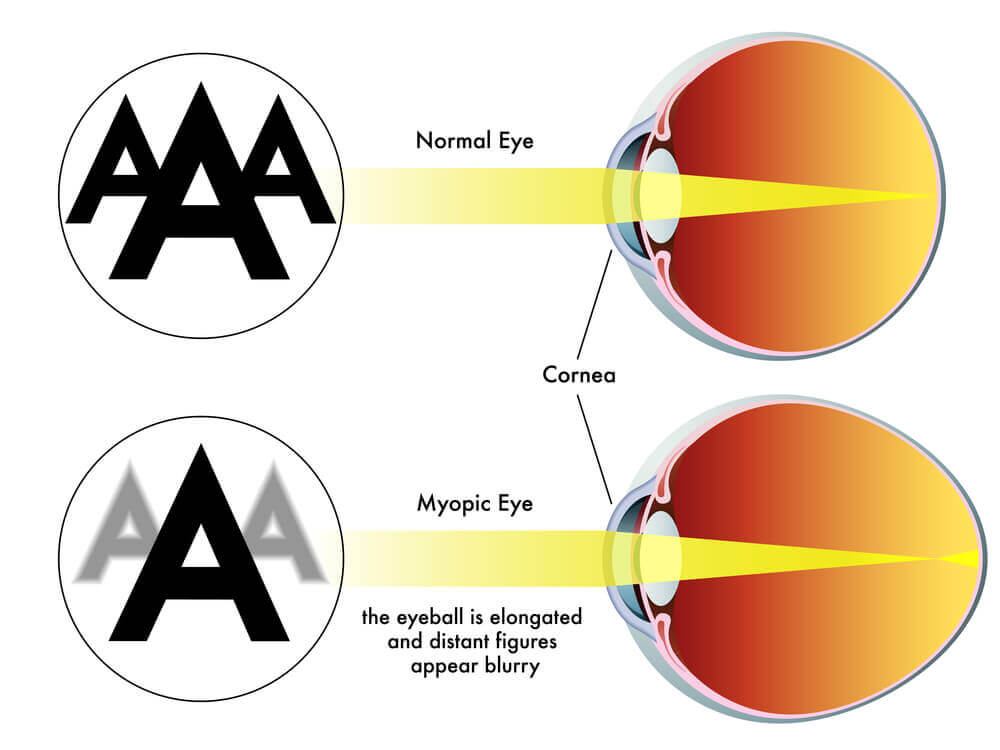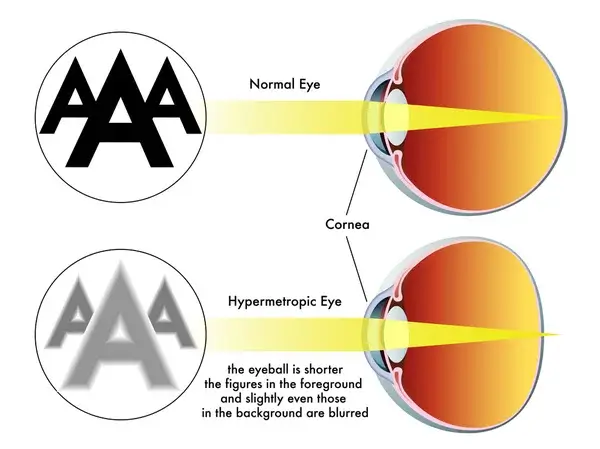Laser Eye Surgery Consultation in North York
Laser-Assisted In Situ Keratomileusis (LASIK) also known as laser eye surgery is a vision correction procedure that uses a laser to reshape the cornea and correct refractive errors1. These errors occur when light does not bend into the eyes as it should due to an irregularly shaped cornea or lens. Depending on what shape the cornea takes, the result could be myopia (nearsightedness), hyperopia (farsightedness), and astigmatism (cornea with steep or elongated curves). Although LASIK can potentially improve vision and has a high success rate, the procedure is not for everyone2.
It is important to get a comprehensive eye health examination to determine whether you could be a potential candidate for this procedure. LASIK is only performed on patients who have passed the initial screenings and are considered to be good candidates. You can book a consultation with us today for your eye health examination that lets you know if LASIK may be right for you. The examination would involve a series of prequalification tests aimed at ensuring that you are a good candidate for the surgical procedure, at which point we will refer you to the best surgeons and laser centers available2.
Eye Exam in North York to Determine if Laser Eye Surgery is Right For You
We provide a comprehensive eye health examination and consultation to determine if you’re a potential candidate for vision correction surgery. Our Optometrist will check for signs of eye infection, dry eyes, high eye pressure, inflammation, and large pupils. We will take measurements of your cornea, noting its shape, thickness, and any irregularities. To determine whether LASIK is for you, we will take you through the main following tests during your eye health examination and consultation3:
Eye Muscle Test
This is also called a binocular vision assessment. The test checks that your eyes work together as one. If they don’t, they will be unable to merge images into one in the brain. A binocular vision disorder leads to other conditions like light sensitivity and poor depth perception. It can also cause complications and a poor outcome of laser eye surgery, making a patient ineligible to get LASIK.


Tear Analysis
This test examines the quantity and quality of your natural tears to ensure that both qualitative and quantitative tear films are normal. If these are not within normal ranges, the LASIK procedure could be impacted as dry eyes will affect your vision and comfort. It would be best to treat your tear quality and/or quantity first in order to be a good candidate for vision correction procedures.
Pupil Size Measurement
The Optometrist will take measurements of your pupils to ensure that they are not too large and do not dilate heavily. People who have either kind of pupils are at risk of experiencing glare, halos, or contrast problems after undergoing laser eye surgery. Using modern laser techniques, these risk factors tend to be minimized.

What Eye Conditions Can Be Treated With Laser Eye Surgery (LASIK)?
Laser Eye surgery can be used to correct the following conditions:
Myopia
Myopia, also called nearsightedness, occurs when light rays focus in front of the retina and cause distant vision to be blurry. This happens when your cornea curves too sharply or your eyeball is slightly longer than normal. People who have myopia can see up close, but not objects that are far away.


Hyperopia
Hyperopia is also called farsightedness. It occurs when the cornea is too flat or the eyeballs are shorter than average. This situation causes light to focus behind the retina instead of focusing on it. Near vision, and in some cases distant vision, becomes blurry. A person with hyperopia can see far distances, but not up close.
Astigmatism
Astigmatism occurs when the cornea curves or flattens irregularly. It could either be elongated or too steep. Astigmatism affects both near and distant vision thereby causing an inability to see objects clearly and sharply at both distances.

Who Can Be a Candidate for Laser Eye Surgery (LASIK)?
Laser eye surgery can only be performed on healthy adults who have used the same contact lens or eyeglass prescription for a year or more. This means that your prescription needs to be stabilized before undergoing laser eye surgery. It is best to have a healthy, thick cornea and a type of refractive error that can be treated with LASIK. People whose vision continues to change are not good candidates for laser eye surgery4.
Other conditions that could make someone unable to undertake the procedure include:
- Severe dry eyes
- Thin corneas
- Cone-shaped cornea (Keratoconus)
- Advanced glaucoma
- Cataract affecting vision
- Corneal scars or disease
- Having a history of getting certain eye infections
- Diabetes
- Being pregnant (as vision can change throughout pregnancy)
What are the Risk Factors Associated with Laser Eye Surgery (LASIK)?
At Kodak Lens Centerpoint Eyecare in North York, our Optometrists are a resource to help you make a decision based on your goals, risk factors, and overall eye health history. The procedure is known to provide excellent improvements in vision. Although a significant loss of vision or other sight-threatening complications are rare, there are risk factors associated with LASIK that you must consider: such as dry eyes, under-corrections or overcorrections, astigmatism, flaps, glare, halos, and double vision. In rare cases, complications could also lead to changes in vision or loss of vision. In these situations, some people may be unable to see as sharply as they did before the surgery. An experienced surgeon will be knowledgeable about what to do if complications arise during or as a result of the surgery. Your choice of surgeon is the most important decision you will take when considering laser eye surgery, which is why our Optometrist will help you in choosing the right one through our detailed referrals and recommendations5.
What are the Main Types of Laser Eye Surgery Available?
Your comprehensive eye health examination at Kodak Lens Centerpoint Eyecare in North York will help determine what type of laser eye surgery is right for you. Given your expectations, your eye health status, and your understanding of the procedure, possible complications, and outcomes, your eye doctor will determine which vision correction surgery is appropriate for you. The state of your eye and the kind of vision correction you need are big factors pointing to what type of laser eye surgery would work best for you. The main types of laser eye surgery are epithelial laser-assisted in-situ keratomileusis (LASIK), photorefractive keratectomy (PRK), laser-assisted subepithelial keratectomy (LASEK), and small incision lenticule extraction (SMILE). Of these types of laser eye surgery, the most commonly performed ones are LASIK and PRK6:
Epithelial Laser-Assisted In-Situ Keratomileusis (LASIK)
LASIK is the most commonly undertaken form of laser eye surgery. In this procedure, the surgeon uses two lasers to operate on the eyes. One of the lasers is used to open a thin flap of the cornea and the other is used to reshape it. After the surgery, the corneal flap is replaced. It re-attaches itself within 24-48 hours. This procedure takes around 15 minutes and you will begin to see results in a short time. LASIK is used to correct myopia, hyperopia, and astigmatism.
Photorefractive Keratectomy (PRK)
PRK is the oldest form of laser eye surgery. In this procedure, the surgeon removes the top layer of the cornea, the epithelium, in order to access the cornea. They then reshape the cornea using a laser. The surgeon does not replace the epithelium. Instead, he allows it to regenerate naturally. PRK is used to correct myopia, hyperopia, and astigmatism.
Co-management Laser Eye Surgery (LASIK) Procedure in North York
Given that we do not perform the surgery ourselves at any of our Kodak Lens locations, our main role is co-managing your LASIK surgery. Co-management is the collaborative care of a patient by two doctors: our referring Optometrist and the best surgeon and laser centers available. After your comprehensive eye health examination and laser eye surgery consultation, our Optometrist at Kodak Lens will refer you to a specialist surgeon to perform your procedure. We will schedule your appointment with the surgeon and send them the results of your comprehensive eye exam, your data (including a history of your eye exams), your discussions with our Optometrist (including the type of vision correction surgery we have determined for your case), and your expectations from the procedure. If they operate on you, we will conduct routine post-operative care examinations (1 day, 1 wk, 1 mth, 3 mths, 6 mths, and 1 yr) to ensure that the healing process is going well and your vision correction is effective7.
Laser Eye Surgery (LASIK) Co-management in North York
Your eye health is our top priority, which is why we strive to help and provide you with a wide range of treatments and solutions for many eye conditions. If you are suffering from hyperopia (farsightedness), myopia (near-sightedness), or astigmatism, you can book an annual eye exam appointment and allow us to help you improve your vision as best as possible.
At Centerpoint Eyecare in North York, our expert Optometrists strive to help you with all your eye care and visual needs. If you think laser eye surgery (LASIK) might be for you, book an appointment with one of our expert Optometrists so we can evaluate your situation and understand all your options. You can visit our website to find out more. You can also call us at 647-351-1131 to get started or click here to ask us a question. Our team will be glad to support you every step of the way.
References
- Kierstan Boyd, 2022, LASIK — Laser Eye Surgery, American Academy of Ophthalmology
- LASIK eye surgery, Mayo Clinic
- Troy Bedinghaus, OD, 2022, Are You a Good Candidate for LASIK Surgery?, Very Well Health
- Kierstan Boyd, 2022, LASIK — Laser Eye Surgery, American Academy of Ophthalmology
- Brian Boxer Wachler, MD, 2019, LASIK risks, and complications, All About Vision
- 2021, Everything you need to know about laser eye surgery, Lenstore Hub
- ERIC SCHMIDT, O.D., 2018, Co-Management: A How-To Guide, Optometric Management
